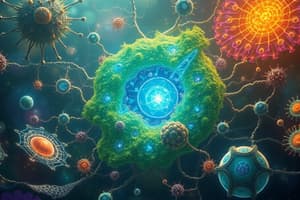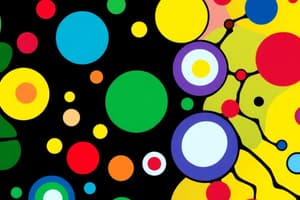Podcast
Questions and Answers
What defines the basic unit of life according to cell theory?
What defines the basic unit of life according to cell theory?
- Cells (correct)
- Tissues
- Organs
- Molecules
Which branch of biology specifically focuses on studying interactions between organisms and their environment?
Which branch of biology specifically focuses on studying interactions between organisms and their environment?
- Genetics
- Microbiology
- Molecular Biology
- Ecology (correct)
In which level of biological organization do individual living entities fall?
In which level of biological organization do individual living entities fall?
- Ecosystems
- Communities
- Populations
- Organisms (correct)
What is the primary role of carbohydrates in living organisms?
What is the primary role of carbohydrates in living organisms?
Which process is responsible for converting glucose into ATP?
Which process is responsible for converting glucose into ATP?
Which of the following statements about gene theory is true?
Which of the following statements about gene theory is true?
What is a characteristic of ecosystems regarding energy flow?
What is a characteristic of ecosystems regarding energy flow?
Which of the following is not considered a biological molecule?
Which of the following is not considered a biological molecule?
Flashcards are hidden until you start studying
Study Notes
Key Concepts in Biology
1. Definition of Biology
- The study of life and living organisms.
- Interdisciplinary field connecting with chemistry, physics, geology, and more.
2. Levels of Biological Organization
- Atoms: Basic units of matter.
- Molecules: Groups of atoms bonded together (e.g., DNA, proteins).
- Cells: Basic unit of life; can be unicellular or multicellular.
- Tissues: Groups of similar cells that perform a specific function.
- Organs: Structures composed of tissues working together.
- Organ Systems: Groups of organs that perform related functions.
- Organisms: Individual living entities.
- Populations: Groups of organisms of the same species in a given area.
- Communities: Interactions of different populations in a specific area.
- Ecosystems: Community interactions with the environment.
- Biosphere: Global sum of all ecosystems.
3. Fundamental Biological Principles
- Cell Theory: All living things are composed of cells; cells are the basic unit of life; all cells arise from pre-existing cells.
- Gene Theory: Traits are inherited through genes, which are located on chromosomes.
- Homeostasis: The ability of an organism to maintain stable internal conditions.
- Evolution: Change in the heritable traits of biological populations over successive generations.
4. Branches of Biology
- Botany: Study of plants.
- Zoology: Study of animals.
- Microbiology: Study of microorganisms.
- Ecology: Study of interactions between organisms and their environment.
- Genetics: Study of heredity and variation in organisms.
- Molecular Biology: Study of biological processes at the molecular level.
5. Biological Molecules
- Carbohydrates: Sugars and starches; primary energy source.
- Proteins: Made of amino acids; essential for structure and function.
- Lipids: Fats and oils; important for cell membranes and energy storage.
- Nucleic Acids: DNA and RNA; genetic information storage and transfer.
6. Cellular Processes
- Photosynthesis: Conversion of light energy into chemical energy by plants.
- Cellular Respiration: Process of converting glucose into ATP (energy).
- Mitosis: Cell division resulting in two identical daughter cells.
- Meiosis: Cell division producing four genetically diverse gametes.
7. Ecosystem Dynamics
- Energy Flow: Movement of energy through an ecosystem (producers → consumers → decomposers).
- Nutrient Cycling: Recycling of essential nutrients in the ecosystem (e.g., carbon cycle, nitrogen cycle).
8. Human Impact on Biology
- Biodiversity Loss: Extinction of species due to habitat destruction, pollution, climate change.
- Conservation Biology: Study and implementation of practices to protect biodiversity.
9. Scientific Method
- Observation: Gathering information.
- Hypothesis: Formulating an educated guess.
- Experimentation: Testing the hypothesis.
- Analysis: Interpreting data and drawing conclusions.
- Communication: Sharing results for peer review and discussion.
Definition of Biology
- Biology investigates life, focusing on living organisms and their interactions.
- It integrates concepts from various scientific disciplines, including chemistry, physics, and geology.
Levels of Biological Organization
- Atoms: Fundamental units that make up all matter.
- Molecules: Formed by bonded atoms; examples include DNA and proteins.
- Cells: The basic unit of life; can exist as single-celled or multicellular organisms.
- Tissues: Collections of similar cells working together for a common function.
- Organs: Structures formed from tissues that perform specific tasks.
- Organ Systems: Combinations of organs that execute related functions.
- Organisms: Independent living entities that can interact with their environment.
- Populations: Groups of the same species occupying a particular area.
- Communities: Different populations interacting within a specific habitat.
- Ecosystems: Combinations of living communities and their physical surroundings.
- Biosphere: The global entirety of all ecosystems, illustrating life on Earth.
Fundamental Biological Principles
- Cell Theory: Asserts that all life forms are composed of cells, which are the fundamental units derived from pre-existing cells.
- Gene Theory: Explains that traits are transmitted through genes located on chromosomes.
- Homeostasis: Describes an organism's ability to maintain stable internal conditions despite external changes.
- Evolution: Reflects changes in hereditary traits within biological populations across generations.
Branches of Biology
- Botany: Focuses on plant life and their biological systems.
- Zoology: Pertains to the study of animals and their behaviors.
- Microbiology: Investigates microscopic organisms, including bacteria and viruses.
- Ecology: Analyzes the relationships between organisms and their environments.
- Genetics: Explores heredity and variation among living organisms.
- Molecular Biology: Studies biological processes at a molecular level, focusing on macromolecules.
Biological Molecules
- Carbohydrates: Composed of sugars and starches; serve as the primary energy source for organisms.
- Proteins: Made of amino acids; crucial for cellular structure and functions.
- Lipids: Include fats and oils; important for forming cell membranes and energy storage.
- Nucleic Acids: DNA and RNA are vital for storing and transmitting genetic information.
Cellular Processes
- Photosynthesis: The process by which plants convert light energy into chemical energy.
- Cellular Respiration: Converts glucose into ATP, providing energy for cellular activities.
- Mitosis: A method of cell division that results in two identical daughter cells.
- Meiosis: A specialized cell division that generates four genetically diverse gametes.
Ecosystem Dynamics
- Energy Flow: Describes how energy moves through ecosystems, from producers to consumers to decomposers.
- Nutrient Cycling: Details the recycling of essential nutrients like carbon and nitrogen within ecosystems.
Human Impact on Biology
- Biodiversity Loss: Driven by habitat destruction, pollution, and climate change, leading to species extinction.
- Conservation Biology: Aims to study and implement measures to preserve biodiversity and ecosystem health.
Scientific Method
- Observation: The initial step of collecting data and information.
- Hypothesis: Creating a testable prediction based on observations.
- Experimentation: Conducting tests to validate or refute the hypothesis.
- Analysis: Evaluating data to draw conclusions based on experimental results.
- Communication: Sharing findings with the broader scientific community for evaluation and discussion.
Studying That Suits You
Use AI to generate personalized quizzes and flashcards to suit your learning preferences.




